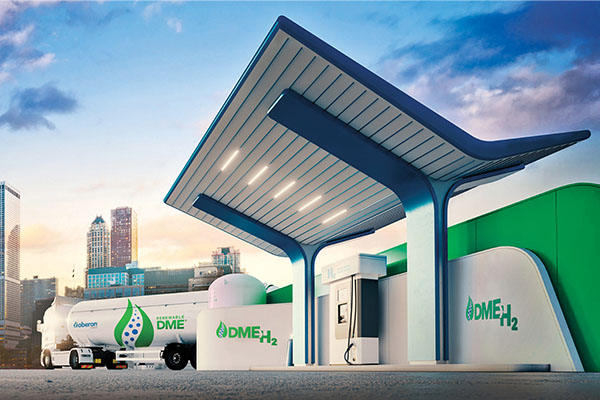Renewable fuel producer: Hydrogen opens opportunities for propane
LP Gas sat down with Rebecca Boudreaux, president and CEO of Oberon Fuels, to understand what propane, hydrogen and dimethyl ether (DME) have in common. The interview has been edited for concision and clarity.

Boudreaux
California-based Oberon Fuels produces DME and renewable DME (rDME), a molecule the company says can serve as:
1. An energy-dense, cost-effective means to move renewable hydrogen.
2. A blending agent for LPG.
3. A diesel replacement.
A public-private partnership between Los Alamos National Laboratory and Oberon Fuels secured funding from the U.S. Department of Energy to scale steam reforming technology to produce renewable hydrogen from rDME.
Suburban Propane Partners owns a 39 percent stake in Oberon Fuels.
LP Gas: How is hydrogen fuel currently produced, stored and distributed?
Boudreaux: Hydrogen is typically stored and transported in two different forms: You have compressed hydrogen, so typically compressed about 10,000 psi, and then you have liquefied hydrogen, which requires cryogenics taken to very low temperatures to become more energy dense, and that’s actually rocket fuel.
Compressed hydrogen can be moved in tube trailers, and it’s typically $600,000-plus to have a compressed hydrogen tube trailer. So you can imagine getting in the logistics space of that is quite expensive. And hydrogen even compressed at 10,000 psi is not very energy dense.
Liquefied hydrogen has the advantage of greater energy density, but then you have to introduce cryogenics, and transporters of liquefied hydrogen are usually a million dollars or more.
LP Gas: How does your model of moving hydrogen improve upon current modes? How does it overlap with the propane industry?

Oberon Fuels and Los Alamos National Laboratory have partnered to develop technology to convert rDME into renewable hydrogen at fueling stations of the future. (Photo courtesy of Oberon Fuels; Sean Pavone/iStock / Getty Images Plus/Getty Images; Petmal/iStock / Getty Images Plus/Getty Images)
Boudreaux: We like to say that rDME is a better hydrogen carrier than hydrogen itself. When you look at the rDME molecule, what you’re really doing is moving hydrogen around – it’s just attached to the molecule. So you can keep the hydrogen on the DME molecule, leverage the existing global LPG infrastructure, move rDME and pull off the hydrogen at the point of use.
When we think about how that’s solving the transport and logistics cost issue, there’s the increased energy density. The DME molecule can be liquefied at about 75 psi, so one tanker – using a modified propane tanker – hauling DME has the same amount of hydrogen in it as three or more trailers of compressed hydrogen. One DME tanker is 80 percent lower cost than a compressed hydrogen tube trailer.
We also know that, on the infrastructure side, storing rDME with, again, propane storage tanks is a much easier way to go, much more stable molecule, than having to store compressed and liquefied hydrogen.
LP Gas: How do rDME and propane blends fit into this picture of transporting hydrogen?
Boudreaux: We see our mission as a company to decarbonize the global LPG industry, while laying the foundation for green hydrogen. By introducing rDME into blends with LPG, in the U.S. and around the world, we are introducing a product that can help companies navigate this energy transition. People get comfortable with the concept, the product, and then as they move toward hydrogen in different applications, they can still use the same DME molecule. The hydrogen is just going to be pulled off and used directly in a fuel cell.
LP Gas: What is the business proposition for a propane company investing in DME and hydrogen?
Boudreaux: It’s an exciting time for the global LPG industry because it has the opportunity to leverage its existing infrastructure, its existing knowledge, existing workforce, to move other molecules and create new lines of business and, in some cases, lower the carbon footprint. Propane companies making investments in the hydrogen space, and in other markets, can leverage their knowledge of logistics and how to move other products, particularly gaseous products.
















